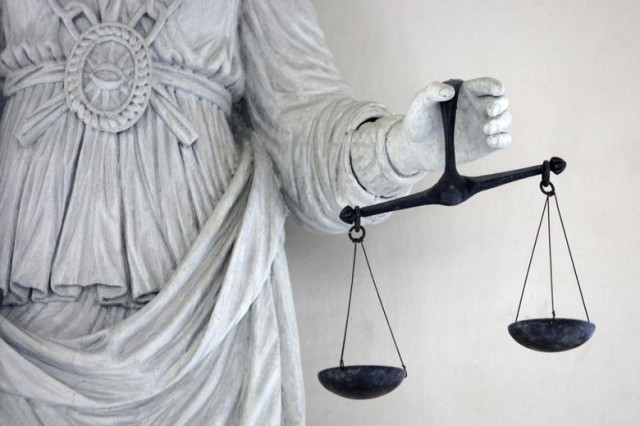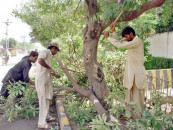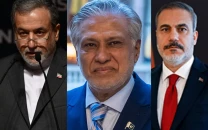Political stalemate: Is constitutional crisis looming?
Courts will be final arbitral on election date issue

The political stalemate on Monday turned into a big constitutional crisis, when President Dr Arif Alvi announced the date for elections in the two provinces, a decision termed “unconstitutional” by lawmakers in the National Assembly.
The hard stance taken by all the mainstream political parties has pushed the country into a constitutional crisis at a time when it is already facing a high risk of default.
Though the country has been embroiled into political, economical and constitutional crises for months now, the recent one started when former premier and Pakistan Tehreek-e-Insaf (PTI) Chairman Imran Khan dissolved the assemblies in Punjab and Khyber-Pakhtunkhwa in an attempt to force early elections.
However, Punjab Governor Baligur Rehman and K-P Governor Haji Ghulam Ali didn’t immediately give a date for the elections in their respective provinces. The matter was subsequently taken to the Lahore High Court (LHC), which directed the Election Commission of Pakistan (ECP) to hold elections within the stipulated time period of 90 days of the dissolution of the assemblies.
Following the LHC order, the ECP consulted the Punjab governor to finalise the election date but failed as Rehman said he had not signed the summary for the dissolution of the assembly; thus, he was not entitled to announce the election date.
Meanwhile, President Alvi started writing letters to ECP and invited the Chief Election Commissioner (CEC) Sikandar Sultan Raja for an ‘urgent meeting’ on February 20 for consultations on the dates for the polls in two provinces.
The ECP, however, excused itself, saying it could not enter into consultations with him over provincial assembly elections as the matter was in court, adding that the Constitution did not empower the ECP to appoint a poll date.
Upon ECP’s refusal, President Alvi didn’t hesitate on Monday to announce the date for elections in Punjab and K-P. In response, the ruling alliance lashed out at the president for taking an “unconstitutional” step and even threatened to go for his impeachment.
The pressure has continuously been mounting and the country has been moving from one stalemate to another, yet everyone is busy interpreting the Constitution the way its suits them.
Some, including Interior Minister Rana Sanaullah, even refused to admit that the country was facing a constitutional crisis.
However, eminent scholar Prof Dr Hassan Askari said that the political system was rapidly unravelling as different institutions and key position-holders were going in different directions, saying that the system can’t properly function this way.
“We don’t know what is going to happen in the next two months and this is the most unfortunate situation that a country could face,” Prof Askari said.
While talking to The Express Tribune at the Parliament House, the interior minister said that the president can’t issue any order on his own as he was constitutionally bound to act on the advice of the prime minister
Announcing the date for elections in Punjab and K-P was an “unconstitutional act” and the president acted just like Imran Khan’s “jiyala or a youthia”, the minister said. “The president should have thought about the prestigious office he is holding,” he added.
“I think impeachment motion could be submitted against him [the president] on announcing the date for elections in two provinces,” Sanaullah responded to a question, “but a decision in this regard would be taken by the heads of the coalition partners.”
On the appointment of the army chief, Sanaullah recalled, the president had “fled to Lahore” with the file to consult PTI chairman Imran Khan, which didn’t suit the prestigious office that he held.
The interior minister simply refused to admit if the country was facing any constitutional breakdown or crisis, saying the president’s order was unconstitutional but there was no need to go to courts against it.
On the contrary, Prof Askari said that the president tried to break a stalemate but got severe criticism in response as his decision had threatened the interests of the ruling alliance.
To the criticism on the president that his decision was unconstitutional, Askari questioned where did the Constitution allow a chief minister to take oath from the National Assembly’s speaker or from the president but it happened when the then Punjab governors refused to administer oath to Hamza Shehbaz and Chaudhry Pervaiz Elahi.
To the argument of the ruling alliance that the president was bound to act on the advice of the prime minister only, Askari asked: “Can’t the president do anything by himself?
He recalled that former president Gen Ziaul Haq had also announced the date for elections in 1988, asking if that was constitutionally correct thing to do. “It’s basically a question of interpretation and everyone is busy interpreting the Constitution in their own way,” the professor said.
He added that such matters usually end up before courts and the issue would hopefully be resolved by the courts within a week or two.
The professor concluded that the current situation was a failure of all those running the country or holding key positions but the basic responsibility was on the sitting government.
He reiterated that the matter now be decided by the courts and their interpretation would now decide when will elections take place in two provinces.



















COMMENTS
Comments are moderated and generally will be posted if they are on-topic and not abusive.
For more information, please see our Comments FAQ